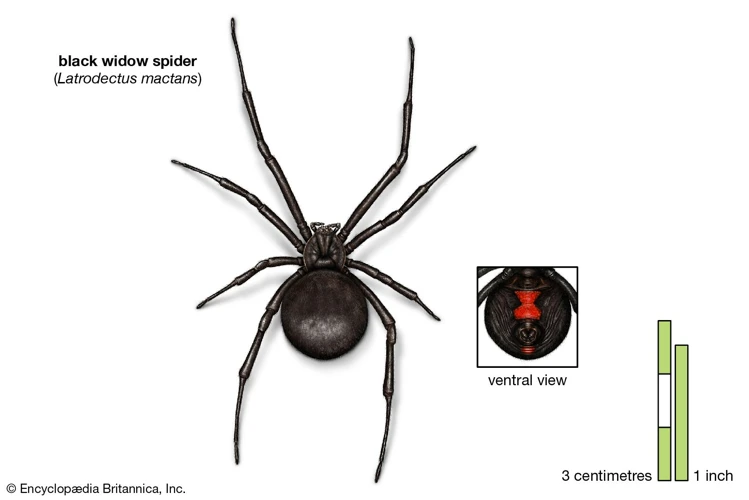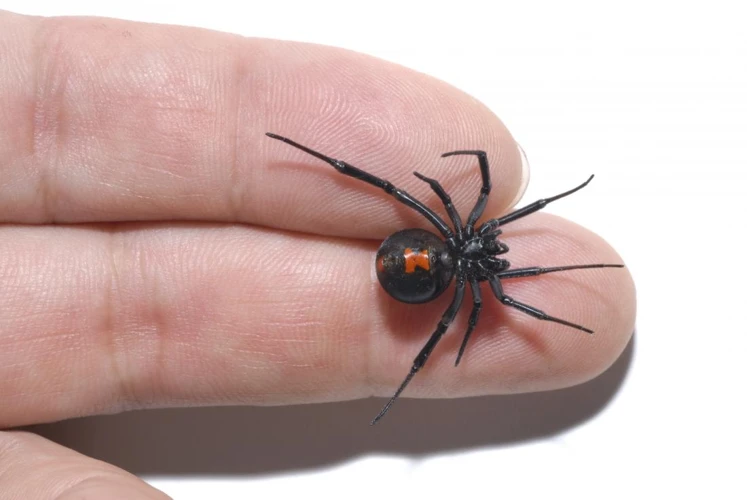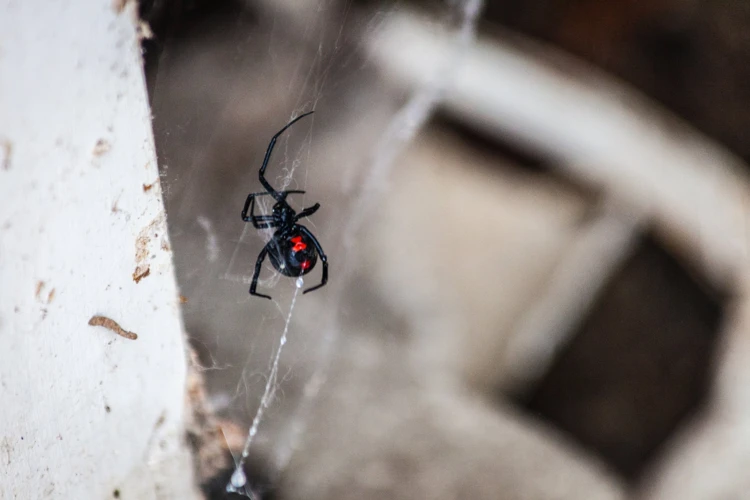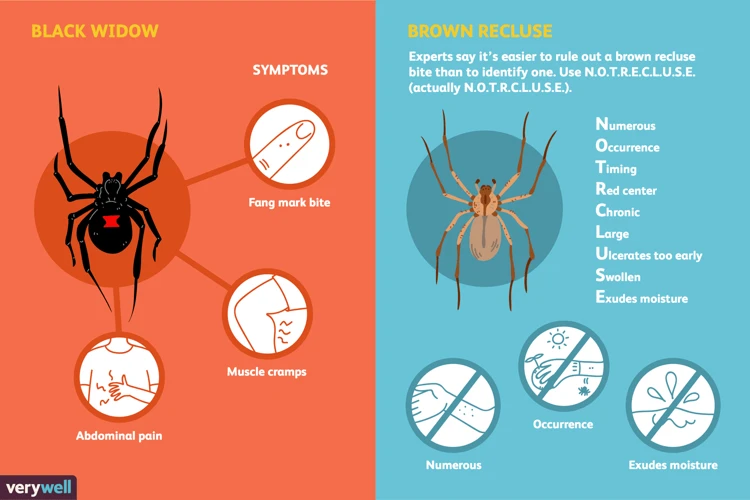Introduction

You’re about to discover the latest information about treating black widow spider bites. These bites can cause severe symptoms, ranging from muscle cramps to seizures, and can be life threatening if left untreated. That’s why it’s critical to understand the traditional and emerging treatments available. In this article, we’ll explore some of the most promising emerging therapies, as well as some traditional and alternative treatments and preventative measures. By the end of this article, you’ll have a better understanding of how to handle black widow spider bites and keep yourself safe. So let’s dive in.
Understanding Black Widow Spider Bites
Black widow spider bites occur when these venomous spiders inject neurotoxins into the skin. These toxins affect the nervous system, leading to symptoms such as muscle cramps, spasms, and pain. The black widow spider is easily identifiable due to its dark coloring and red hourglass-shaped markings on its abdomen. These spiders are usually found in dark and dry environments, such as woodpiles, garages, and basements.
Symptoms of a black widow spider bite
The symptoms of a black widow spider bite can vary depending on the amount of toxin injected and the individual’s sensitivity to the venom. Common symptoms include:
| Symptoms | Description |
|---|---|
| Muscle cramps and spasms | These are usually the first symptoms to occur and can last for several hours. |
| Pain | The bite area may feel tender or painful and can become red and swollen. |
| Sweating | Increased sweating, particularly around the bite area, is common. |
| Nausea and vomiting | These symptoms may occur in severe cases. |
| Headache and dizziness | These symptoms may occur in severe cases and can be accompanied by difficulty breathing. |
If you suspect that you have been bitten by a black widow spider, it’s important to seek medical attention immediately. For more information on how to identify and treat black widow spider bites, check out our guide on medical attention for black widow spider bites.
Traditional Treatments

Traditional Treatments for black widow spider bites are the first line of defense when it comes to combating the potentially life-threatening symptoms of this venomous spider attack. Although the most dangerous effects, such as respiratory paralysis, are rare, getting medical attention immediately after discovering the bite site is still key to avoiding complications. Antivenom and pain management are two of the most widely-used traditional treatments for alleviating the harsh symptoms of black widow spider bites. If you’re interested in learning more about the specifics of these treatments and how they work, check out our article on antivenom and our guide on how to deal with pain management after a black widow spider bite.
Antivenom
Antivenom is the most effective traditional treatment for severe black widow spider bites. Antivenom is a medication made from the antibodies of horses or sheep. The medication works by neutralizing the spider venom and reducing the symptoms caused by the bite, such as severe pain and muscle cramps.
It is crucial to seek medical attention immediately if you suspect that you have been bitten by a black widow spider. Only a healthcare professional can determine if antivenom treatment is necessary. If the bite is severe or you are experiencing severe symptoms, your doctor may administer antivenom. Antivenom is typically administered through an intravenous (IV) injection in a hospital or medical center.
It is essential to note that antivenom can have side effects, including allergic reactions. Therefore, it should only be administered by a healthcare professional in a medical setting with appropriate monitoring. Additionally, antivenom is only recommended for severe black widow spider bites and not for mild or moderate bites.
It is crucial to note that antivenom treatment can be expensive and not widely available. The production process of antivenom is complex and time-consuming. It is not typically used in every case of black widow spider bites.
Below is a table summarizing the pros and cons of antivenom treatment for black widow spider bites:
| Pros | Cons |
|---|---|
| Effective in treating severe bites | Expensive |
| Works by neutralizing the spider venom | Can have side effects, including allergic reactions |
| Administered by a healthcare professional in a medical setting | Not widely available |
Remember, seeking medical attention immediately is crucial if you suspect a black widow spider bite. For more information on black widow spider bites, including steps to take if you are bitten, check out our article on Black Widow Spider Bite Steps.
Pain Management
Managing the intense pain caused by a black widow spider bite is a crucial part of the treatment process. Over-the-counter pain medications such as acetaminophen or ibuprofen can help relieve mild pain, but stronger opioid medications may be needed for more severe pain. It is important to seek medical attention immediately if you are experiencing severe pain after a black widow spider bite. In addition to medications, the following pain management techniques may also be helpful:
- Ice: Applying ice to the affected area can help reduce pain and swelling. Wrap the ice pack in a towel or cloth to avoid direct contact with the skin.
- Elevation: Elevating the bitten limb above the heart can help reduce swelling and decrease pain.
- Relaxation techniques: Practicing relaxation techniques, such as deep breathing or meditation, can help reduce pain and anxiety.
- Distraction: Distracting yourself from the pain by watching a movie or listening to music can be an effective pain management technique.
It is important to note that while pain management is important, it should not be the only focus of treatment for a black widow spider bite. Seeking medical attention and following proper wound care protocols are also crucial for a successful recovery. For more information on proper care for a black widow spider bite, check out our article on Black Widow Bite Care.
Emerging Treatments

Innovative breakthroughs in medical science have given hope to those suffering from the overwhelming symptoms of black widow spider bites. Though traditional treatments like antivenom and pain management have proven to be effective, emerging treatments have offered new solutions to heal the wound and alleviate pain. These cutting-edge treatments include wound debridement, stem cells, and natural remedies. However, it is important to note that medical attention should always be sought immediately after a black widow spider bite. Let’s explore these new treatments that may prove beneficial in combination with standard care.
Wound Debridement
Wound debridement is a critical emerging treatment that can help in the recovery from black widow spider bites. It involves the removal of damaged tissue from the bite area, which can help in preventing the spread of infection and promoting faster healing. The process can be painful and should be carried out only by a medical professional in a sterile environment.
There are different techniques for wound debridement, including surgical, chemical, and mechanical methods. Surgical debridement involves the use of a scalpel or other sharp instrument to remove dead or damaged tissue. Chemical debridement, on the other hand, uses enzymes or other chemicals to dissolve or soften the tissue, making it easier to remove. Mechanical debridement involves the use of dressings or other materials to remove the tissue.
Although wound debridement can be an effective treatment for black widow spider bites, it may not be suitable for all patients, particularly those with underlying health conditions or compromised immune systems. In some cases, other treatments, such as antivenom or pain management, may be necessary.
It’s important to remember that wound debridement is not a substitute for seeking medical attention. If you think you’ve been bitten by a black widow spider, it’s essential to seek medical attention immediately. Delay in treatment can result in severe complications or even death. If you want to know more about medical attention and treatment for black widow bites depending on age, follow the link /black-widow-spider-bite-treatment-kids-vs-adults/.
Also, some natural remedies can be helpful during the wound debridement process. For example, tea tree oil has been shown to have antimicrobial and anti-inflammatory properties, making it an excellent addition to the wound care routine. If you want to know more about natural remedies for black widow spider bites, follow the link /natural-remedies-black-widow-spider-bite/.
Prevention of black widow spider bites is always better than cure. To learn how to minimize the risk of being bitten and what to do in case of emergency, check out our article /preventing-black-widow-bites/.
Stem Cells
Studies have shown that stem cells offer promising results in the treatment of black widow spider bites. Stem cells are undifferentiated cells that have the ability to differentiate into different cell types, including skin cells, muscle cells, and nerve cells. This means that they can potentially aid in the regeneration of damaged tissue caused by the spider’s venom.
How do stem cells work?
Stem cells work by migrating to the site of the injury or damage and releasing growth factors. These growth factors stimulate the regeneration and repair of the damaged tissue.
What are the benefits of using stem cells?
Using stem cells in the treatment of black widow spider bites can provide several benefits. Firstly, it can help to promote faster healing and reduce scarring. Secondly, it can help to relieve pain associated with the bite. Lastly, it can help to restore function to the affected area.
How are stem cells used to treat black widow spider bites?
Stem cells can be used in several ways, including injected into the site of the bite or applied externally as a topical treatment. The stem cells will then migrate to the site of the injury and stimulate the regeneration of damaged tissue.
Are there any risks or side effects?
Because stem cells are taken from the patient’s own body, there is low risk of rejection or adverse reaction. However, as with any medical treatment, there is always a risk of infection or other complications. It is important to seek medical attention as soon as possible after being bitten by a black widow spider, and to discuss all treatment options with a healthcare professional.
Stem cells offer a promising new treatment option for black widow spider bites. While more research is needed to fully understand their effectiveness, they have shown great potential in promoting healing and relieving pain. It is important to seek medical attention immediately after being bitten and to discuss all treatment options with a healthcare professional. For more information on the medical attention necessary after a black widow spider bite, visit this page.
Natural Remedies
When it comes to treating a black widow spider bite, natural remedies have been gaining popularity in recent years. While they may not be scientifically proven, many people find them to be effective in reducing pain and inflammation. Here are some of the most commonly used natural remedies:
| Remedy | Benefits | How to Use |
|---|---|---|
| Activated charcoal | May help absorb venom and alleviate symptoms | Apply a paste of activated charcoal and water to the bite area and cover with a bandage |
| Tea tree oil | Has natural antiseptic and anti-inflammatory properties | Apply a few drops of tea tree oil directly to the bite area and cover with a bandage |
| Lavender oil | Can help reduce pain and inflammation | Massage a few drops of lavender oil onto the bite area |
| Epsom salt | May help draw out venom and reduce swelling | Dissolve Epsom salt in warm water and soak the affected area for 10-15 minutes |
| Aloe vera | Has natural anti-inflammatory properties and can help soothe the skin | Apply aloe vera gel directly to the bite area and cover with a bandage |
It’s important to note that while natural remedies may provide some relief, they should never be used as a substitute for medical treatment. If you experience severe symptoms or have an allergic reaction to a black widow spider bite, seek medical attention immediately. Natural remedies can be used in conjunction with traditional medical treatments, but should not be relied upon as the sole form of treatment.
If you’re interested in learning more about natural remedies for spider bites, check out our article on PT Black Widow Bite.
Alternative Therapies

When it comes to treating black widow spider bites, many people turn to traditional medical treatments such as antivenom and pain management. However, there are alternative therapies that have gained popularity in recent years. These therapies, while not always backed by scientific evidence, may provide relief and help speed up the healing process. Below we explore some of the alternative therapies that people use to treat black widow spider bites. Keep in mind that these treatments should always be used in conjunction with traditional medical care and under the guidance of a healthcare professional.
Acupuncture
Acupuncture is an alternative therapy that is becoming increasingly popular in the Western world for the treatment of various medical conditions, including black widow spider bites. Acupuncture is a traditional Chinese medicine that involves the insertion of thin needles into specific points on the body. It is believed to stimulate the body’s natural healing process and promote pain relief.
How Does Acupuncture Help?
Acupuncture may help alleviate the symptoms of a black widow spider bite by promoting blood circulation, reducing inflammation, and releasing natural painkillers. According to traditional Chinese medicine, black widow spider bites can cause an imbalance in the body’s energy flow, known as Qi. Acupuncture helps to restore this balance and promote healing.
What to Expect During an Acupuncture Session?
During an acupuncture session, a trained practitioner will insert very thin, sterile needles into specific points on the body. The needles may be left in place for about 20-30 minutes, during which time the practitioner may gently manipulate the needles to promote the desired effect.
Is Acupuncture Safe?
Acupuncture is generally considered safe when performed by a trained and licensed practitioner. The needles used are sterile and disposable, and the treatment is generally painless. However, it is important to ensure that you receive treatment from a licensed practitioner, as there is a risk of infection or injury if the practitioner is not properly trained.
Acupuncture vs. Other Treatments
While traditional treatments for black widow spider bites such as antivenom and painkillers are effective, acupuncture provides a natural, non-invasive alternative for pain relief and symptom management. It can also be used in conjunction with traditional treatments to enhance their effectiveness.
If you are considering acupuncture for the treatment of a black widow spider bite, it is important to speak with a licensed practitioner to determine if it is an appropriate course of treatment for you. Acupuncture may also be used for other medical conditions, including chronic pain, stress, and digestive disorders.
| Pros | Cons |
|---|---|
| Promotes natural healing process | May cause mild soreness or bruising at the needle insertion site |
| Non-invasive and drug-free | Not covered by all insurance plans and can be expensive |
| Can be used in conjunction with traditional treatments | Not suitable for individuals with certain medical conditions, including bleeding disorders and pacemakers |
| No known risk of addiction or dependency | Not a substitute for emergency medical care in severe cases |
Herbal Medicine
Many people turn to herbal medicine to complement traditional treatments for black widow spider bites. Here are some herbs that have been used for centuries to help alleviate symptoms:
- Arnica – this herb is known for its anti-inflammatory and analgesic properties. It can be applied topically to the affected area in the form of creams, ointments or gels to help reduce pain and swelling.
- Calendula – also known as marigold, calendula has anti-inflammatory, antiseptic, and antibacterial properties. It can be applied topically to the wound to reduce inflammation and irritation.
- Echinacea – is an herbal supplement that is known for its immune-boosting properties. It can be taken orally to help improve the body’s immune response and reduce the severity of symptoms after a black widow spider bite.
- Ginger – contains compounds that have anti-inflammatory properties that can help reduce swelling and pain. It can be taken orally in the form of tea or supplements to help alleviate symptoms.
- Licorice – has anti-inflammatory, antiviral, and antibacterial properties. It can be applied topically to the affected area to reduce swelling and prevent infections.
- Turmeric – contains curcumin, which has strong anti-inflammatory and antioxidant properties. It can be taken orally as a supplement or used topically as an ointment to help alleviate symptoms.
It’s important to note that while these herbs may help alleviate symptoms, they should not be used as a substitute for medical treatment. Always consult with a healthcare professional before using any herbal remedies. Additionally, some herbs may have interactions with other medications or medical conditions, so it’s important to disclose all supplements and herbs you are taking to your healthcare provider.
Prevention and First Aid
Our best defense against black widow spider bites is prevention. It is crucial to be aware of the spiders’ habitats and behaviors to avoid encounters with them altogether. In case of a bite, taking immediate first aid measures can help minimize the effects and prevent further complications. In this section, we will explore ways to protect yourself from black widow spiders and what to do if you get bitten. Let’s take a closer look.
How to Avoid Black Widow Spider Bites
It is important to take precautions to avoid getting bitten by black widow spiders. Here are some measures you can take to prevent black widow spider bites:
| Measure | Description |
|---|---|
| Wear protective clothing | Wear long-sleeved shirts, pants, and gloves when working outside, especially in areas where black widow spiders may reside, such as woodpiles, rocks, and dark corners. |
| Keep your home and yard tidy | Remove piles of debris, rocks, and woodpiles from your yard. Inside your home, vacuum regularly and eliminate clutter, especially in dark areas such as basements and garages. |
| Seal entryways | Make sure your windows and doors are properly sealed, and use screens on doors and windows to prevent spiders from entering your home. |
| Use insecticides | If you have a serious problem with black widow spiders, you can use commercially available insecticides. However, make sure to read the label carefully and follow all instructions to avoid any harmful exposure. |
By following these measures, you can significantly reduce your risk of coming into contact with black widow spiders and suffering from their painful bite.
What to Do If You Get Bitten
If you are bitten by a black widow spider, it is important to act quickly. Follow these steps to reduce the severity of the bite:
- Clean the wound: Use soap and water to clean the bitten area, and apply a cool compress to help reduce swelling.
- Seek medical attention: If you experience severe symptoms such as muscle cramps, difficulty breathing, or severe pain, seek emergency medical attention immediately. Antivenom is the most effective treatment for black widow spider bites, and medical professionals will be able to administer it if necessary.
- Take pain medication: Over-the-counter pain medications such as acetaminophen or ibuprofen can help relieve pain and reduce fever if you are experiencing symptoms such as muscle cramps or headache.
- Drink plenty of fluids: Staying hydrated can help flush toxins from your system and reduce the severity of your symptoms. Aim to drink at least 8 glasses of water per day.
- Stay calm: While black widow spider bites can be frightening, it is important to stay calm and avoid panicking. Anxiety and stress can exacerbate symptoms and make them more difficult to manage.
Remember, it is always better to be safe than sorry when it comes to black widow spider bites. If you are unsure whether you have been bitten or are experiencing severe symptoms, seek medical attention as soon as possible.
Conclusion
In conclusion, black widow spider bites can be a serious and painful experience for those who are unlucky enough to get bitten. The traditional treatment for black widow spider bites involves the use of antivenom and pain management therapies. However, with the emergence of new treatments, patients have more options than ever before.
Wound debridement is one of the emerging treatments for black widow spider bites that has shown promise. This involves removing dead tissue from the wound to allow for better healing. Stem cell therapy has also been shown to be effective in treating the effects of the venom. Natural remedies, such as the use of essential oils and herbs, have also gained popularity as an alternative to traditional treatments.
Alternative therapies, such as acupuncture and herbal medicine, have also been used to treat the symptoms of black widow spider bites. These therapies can help to alleviate pain and reduce inflammation.
Prevention and first aid are also important when it comes to dealing with black widow spider bites. Avoiding the spider’s habitat and taking steps to protect yourself can go a long way in preventing bites. If you do get bitten, seeking medical attention immediately and following proper first aid procedures can help to minimize the effects of the venom.
Overall, understanding the best ways to prevent and treat black widow spider bites is vital for anyone who spends time in areas where these spiders are present. By staying informed and taking the necessary precautions, you can help to ensure your safety and wellbeing.
Frequently Asked Questions
Can a black widow spider bite kill you?
While rare, black widow spider bites can be deadly if left untreated. Seek medical attention immediately if you suspect you have been bitten.
What are the symptoms of a black widow spider bite?
Symptoms of a black widow spider bite can include severe muscle pain, cramping, fever, and difficulty breathing.
Can you die from a black widow spider bite?
While black widow spider bites are rarely fatal, they can cause serious complications if left untreated.
What should I do if I have been bitten by a black widow spider?
Seek medical attention immediately if you suspect you have been bitten by a black widow spider. Do not try to treat the bite on your own.
What is the traditional treatment for black widow spider bites?
Antivenom and pain management are the traditional treatments for black widow spider bites.
What is wound debridement?
Wound debridement is the process of removing dead or infected tissue from a wound to promote healing.
Can stem cells be used to treat black widow spider bites?
Some studies have shown promise in using stem cells to treat black widow spider bites, but more research is needed.
What are some natural remedies for black widow spider bites?
Some natural remedies for black widow spider bites include applying a cold compress, taking over-the-counter pain relievers, and drinking plenty of fluids.
Can acupuncture be used to treat black widow spider bites?
While there is no scientific evidence to support the use of acupuncture for black widow spider bites, some people find it helpful for managing pain and promoting relaxation.
How can I prevent black widow spider bites?
To prevent black widow spider bites, avoid areas where they are known to live, wear protective clothing when outdoors, and use insect repellent.






